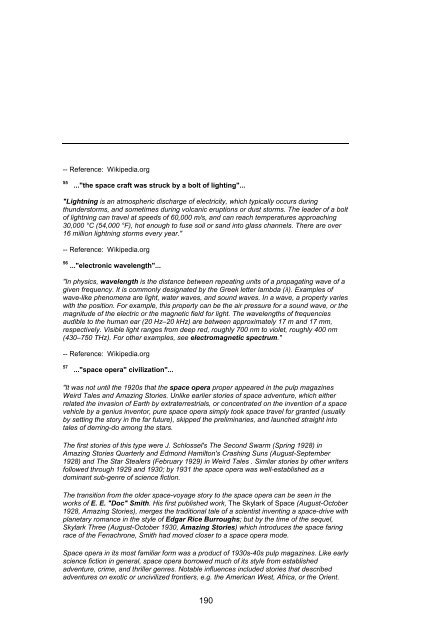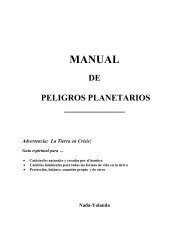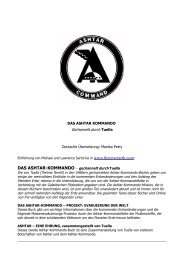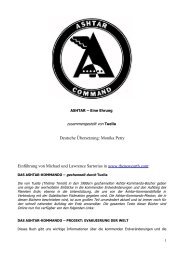ALIEN INTERVIEW - THE NEW EARTH - Earth Changes and The ...
ALIEN INTERVIEW - THE NEW EARTH - Earth Changes and The ...
ALIEN INTERVIEW - THE NEW EARTH - Earth Changes and The ...
You also want an ePaper? Increase the reach of your titles
YUMPU automatically turns print PDFs into web optimized ePapers that Google loves.
-- Reference: Wikipedia.org<br />
55 ..."the space craft was struck by a bolt of lighting"...<br />
"Lightning is an atmospheric discharge of electricity, which typically occurs during<br />
thunderstorms, <strong>and</strong> sometimes during volcanic eruptions or dust storms. <strong>The</strong> leader of a bolt<br />
of lightning can travel at speeds of 60,000 m/s, <strong>and</strong> can reach temperatures approaching<br />
30,000 °C (54,000 °F), hot enough to fuse soil or s<strong>and</strong> into glass channels. <strong>The</strong>re are over<br />
16 million lightning storms every year."<br />
-- Reference: Wikipedia.org<br />
56 ..."electronic wavelength"...<br />
"In physics, wavelength is the distance between repeating units of a propagating wave of a<br />
given frequency. It is commonly designated by the Greek letter lambda (λ). Examples of<br />
wave-like phenomena are light, water waves, <strong>and</strong> sound waves. In a wave, a property varies<br />
with the position. For example, this property can be the air pressure for a sound wave, or the<br />
magnitude of the electric or the magnetic field for light. <strong>The</strong> wavelengths of frequencies<br />
audible to the human ear (20 Hz–20 kHz) are between approximately 17 m <strong>and</strong> 17 mm,<br />
respectively. Visible light ranges from deep red, roughly 700 nm to violet, roughly 400 nm<br />
(430–750 THz). For other examples, see electromagnetic spectrum."<br />
-- Reference: Wikipedia.org<br />
57 ..."space opera" civilization"...<br />
"It was not until the 1920s that the space opera proper appeared in the pulp magazines<br />
Weird Tales <strong>and</strong> Amazing Stories. Unlike earlier stories of space adventure, which either<br />
related the invasion of <strong>Earth</strong> by extraterrestrials, or concentrated on the invention of a space<br />
vehicle by a genius inventor, pure space opera simply took space travel for granted (usually<br />
by setting the story in the far future), skipped the preliminaries, <strong>and</strong> launched straight into<br />
tales of derring-do among the stars.<br />
<strong>The</strong> first stories of this type were J. Schlossel's <strong>The</strong> Second Swarm (Spring 1928) in<br />
Amazing Stories Quarterly <strong>and</strong> Edmond Hamilton's Crashing Suns (August-September<br />
1928) <strong>and</strong> <strong>The</strong> Star Stealers (February 1929) in Weird Tales . Similar stories by other writers<br />
followed through 1929 <strong>and</strong> 1930; by 1931 the space opera was well-established as a<br />
dominant sub-genre of science fiction.<br />
<strong>The</strong> transition from the older space-voyage story to the space opera can be seen in the<br />
works of E. E. "Doc" Smith. His first published work, <strong>The</strong> Skylark of Space (August-October<br />
1928, Amazing Stories), merges the traditional tale of a scientist inventing a space-drive with<br />
planetary romance in the style of Edgar Rice Burroughs; but by the time of the sequel,<br />
Skylark Three (August-October 1930, Amazing Stories) which introduces the space faring<br />
race of the Fenachrone, Smith had moved closer to a space opera mode.<br />
Space opera in its most familiar form was a product of 1930s-40s pulp magazines. Like early<br />
science fiction in general, space opera borrowed much of its style from established<br />
adventure, crime, <strong>and</strong> thriller genres. Notable influences included stories that described<br />
adventures on exotic or uncivilized frontiers, e.g. the American West, Africa, or the Orient.<br />
190





